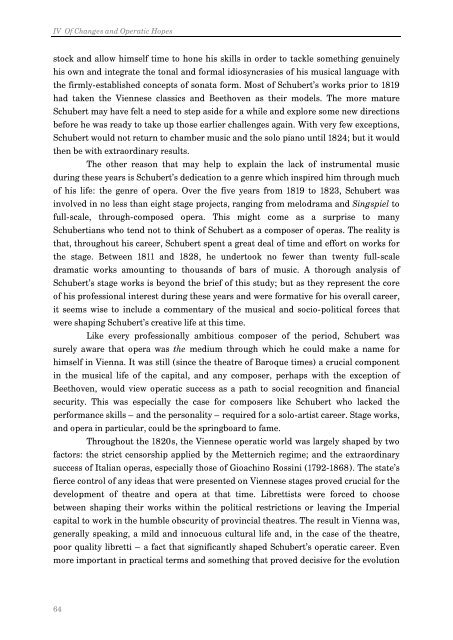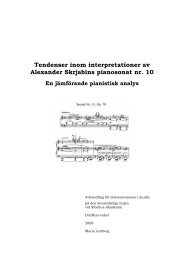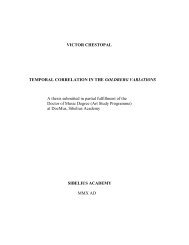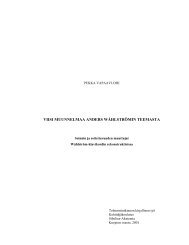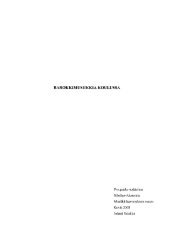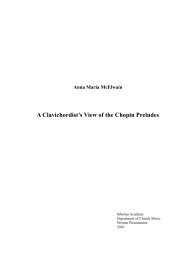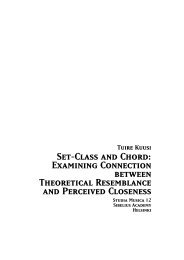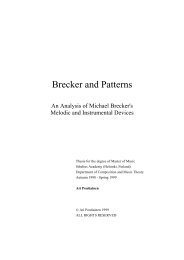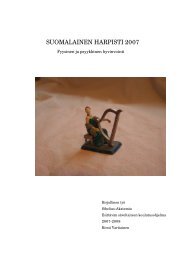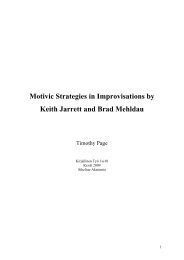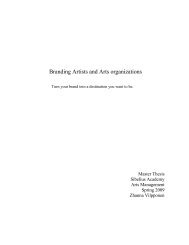The Unfinished Piano Sonatas of Franz Schubert Javier ... - Ethesis
The Unfinished Piano Sonatas of Franz Schubert Javier ... - Ethesis
The Unfinished Piano Sonatas of Franz Schubert Javier ... - Ethesis
You also want an ePaper? Increase the reach of your titles
YUMPU automatically turns print PDFs into web optimized ePapers that Google loves.
IV Of Changes and Operatic Hopes<br />
stock and allow himself time to hone his skills in order to tackle something genuinely<br />
his own and integrate the tonal and formal idiosyncrasies <strong>of</strong> his musical language with<br />
the firmly-established concepts <strong>of</strong> sonata form. Most <strong>of</strong> <strong>Schubert</strong>’s works prior to 1819<br />
had taken the Viennese classics and Beethoven as their models. <strong>The</strong> more mature<br />
<strong>Schubert</strong> may have felt a need to step aside for a while and explore some new directions<br />
before he was ready to take up those earlier challenges again. With very few exceptions,<br />
<strong>Schubert</strong> would not return to chamber music and the solo piano until 1824; but it would<br />
then be with extraordinary results.<br />
<strong>The</strong> other reason that may help to explain the lack <strong>of</strong> instrumental music<br />
during these years is <strong>Schubert</strong>’s dedication to a genre which inspired him through much<br />
<strong>of</strong> his life: the genre <strong>of</strong> opera. Over the five years from 1819 to 1823, <strong>Schubert</strong> was<br />
involved in no less than eight stage projects, ranging from melodrama and Singspiel to<br />
full-scale, through-composed opera. This might come as a surprise to many<br />
<strong>Schubert</strong>ians who tend not to think <strong>of</strong> <strong>Schubert</strong> as a composer <strong>of</strong> operas. <strong>The</strong> reality is<br />
that, throughout his career, <strong>Schubert</strong> spent a great deal <strong>of</strong> time and effort on works for<br />
the stage. Between 1811 and 1828, he undertook no fewer than twenty full-scale<br />
dramatic works amounting to thousands <strong>of</strong> bars <strong>of</strong> music. A thorough analysis <strong>of</strong><br />
<strong>Schubert</strong>’s stage works is beyond the brief <strong>of</strong> this study; but as they represent the core<br />
<strong>of</strong> his pr<strong>of</strong>essional interest during these years and were formative for his overall career,<br />
it seems wise to include a commentary <strong>of</strong> the musical and socio-political forces that<br />
were shaping <strong>Schubert</strong>’s creative life at this time.<br />
Like every pr<strong>of</strong>essionally ambitious composer <strong>of</strong> the period, <strong>Schubert</strong> was<br />
surely aware that opera was the medium through which he could make a name for<br />
himself in Vienna. It was still (since the theatre <strong>of</strong> Baroque times) a crucial component<br />
in the musical life <strong>of</strong> the capital, and any composer, perhaps with the exception <strong>of</strong><br />
Beethoven, would view operatic success as a path to social recognition and financial<br />
security. This was especially the case for composers like <strong>Schubert</strong> who lacked the<br />
performance skills – and the personality – required for a solo-artist career. Stage works,<br />
and opera in particular, could be the springboard to fame.<br />
Throughout the 1820s, the Viennese operatic world was largely shaped by two<br />
factors: the strict censorship applied by the Metternich regime; and the extraordinary<br />
success <strong>of</strong> Italian operas, especially those <strong>of</strong> Gioachino Rossini (1792-1868). <strong>The</strong> state’s<br />
fierce control <strong>of</strong> any ideas that were presented on Viennese stages proved crucial for the<br />
development <strong>of</strong> theatre and opera at that time. Librettists were forced to choose<br />
between shaping their works within the political restrictions or leaving the Imperial<br />
capital to work in the humble obscurity <strong>of</strong> provincial theatres. <strong>The</strong> result in Vienna was,<br />
generally speaking, a mild and innocuous cultural life and, in the case <strong>of</strong> the theatre,<br />
poor quality libretti – a fact that significantly shaped <strong>Schubert</strong>’s operatic career. Even<br />
more important in practical terms and something that proved decisive for the evolution<br />
64


